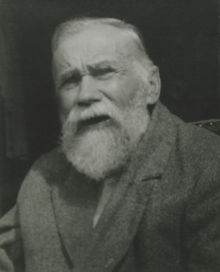Frederik van Eeden > Frederik van Eeden: the philosopher and spiritualist
In many of his ideas, Van Eeden was greatly influenced by the spirit of the age. His notions about living in harmony with nature, based on esotericism and mysticism, nevertheless proved to retain their value for later generations. Van Eeden thus found both in life and after his death kindred spirits who saw in him the leader he so much wanted to be.
Significa
From his childhood on, Van Eeden displayed great interest in philosophy and spirituality. His 1897 book Redekunstige grondslag van verstandhouding (Analytic foundation of understanding) ranks as the first Dutch study in the field of significs, a school of thought dealing with the relation between language and human understanding. Van Eeden was involved in the creation of the Internationaal Instituut voor Wijsbegeerte (International Institute of Philosophy) in 1917 and the Signifisch Genootschap (Signific Society) in 1922. He also was in contact with signific thinkers like Jac. van Ginneken and Gerrit Mannoury.
Spiritism
Gradually, Van Eeden allowed the supernatural to play an increasingly greater role in his life. Influenced by principles of theosophy, his fascination for the deeper significance of dreams extended to parapsychology and spiritism. The event of his son Paul's death of tuberculosis in 1913 reinforced this thinking. In séances led by a psychic, Van Eeden believed he received messages from his son and other dead people.
Catholicism
The spirituality of the Roman Catholic Church appealed to Frederik van Eeden more and more as he grew older. The third volume of Het lied van schijn en wezen (1922) led to his conversion to Catholicism. That same year, he was baptized in St Paul's Abbey in Oosterhout.

